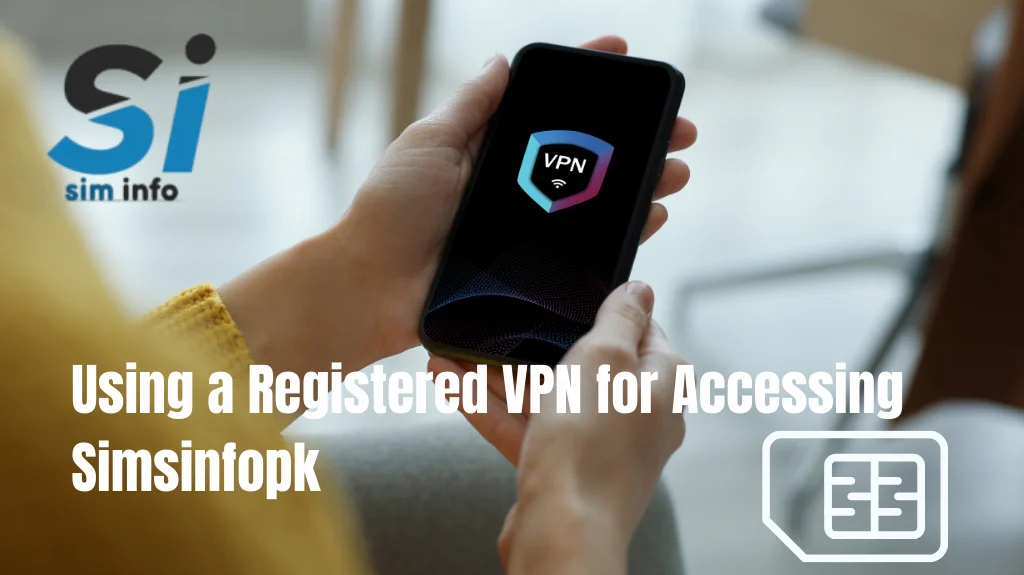Using a Registered VPN for Accessing Simsinfopk
In an era of increasing online threats and privacy concerns, Virtual Private Networks (VPNs) have become essential for securing sensitive data, especially when accessing information related to SIM cards. However, in countries like Pakistan, using a VPN must comply with government regulations. This article explores the benefits of using a registered VPN for accessing SIM information, the process of registering a VPN with the Pakistan Telecommunication Authority (PTA), and the drawbacks of using unregistered VPNs.

What is a VPN?
A VPN (Virtual Private Network) encrypts your internet traffic, ensuring a secure connection between your device and the server. This masks your IP address and protects sensitive information, making it useful when accessing data from SIM cards and mobile networks securely.
How to Use a VPN to Access Simsinfopk.com Without Issues
When accessing Simsinfopk.com to find SIM card details, users might occasionally encounter issues where the site fails to load. This is often due to regional restrictions or network limitations. In such cases, using a VPN (Virtual Private Network) is highly recommended to bypass these blocks and access the site seamlessly. A VPN encrypts your internet connection and routes it through servers in different locations, allowing you to access restricted websites securely and anonymously. By masking your IP address, a VPN ensures that you can retrieve the necessary SIM information without being blocked by network filters or country-specific restrictions
Benefits of Using a Registered VPN for SIM Information
Using a VPN while accessing SIM card details can provide multiple benefits, such as:
- Data Encryption: VPNs secure your internet traffic, preventing unauthorized access to sensitive SIM data.
- Privacy Protection: Your real IP address is hidden, reducing the risk of being tracked while retrieving SIM-related information.
- Bypassing Geo-Restrictions: If you need access to SIM data from another country, a VPN can route your connection through servers located elsewhere.
However, in Pakistan, using an unregistered VPN can have legal consequences. The government has strict policies regarding VPN usage to monitor and prevent unauthorized internet activities.
How to Register a VPN with PTA
If you plan to use a VPN in Pakistan, it’s essential to register it with the PTA. Here’s how you can do it:
- Visit PTA’s Official Website: Go to the PTA VPN registration portal.
- Fill Out the Application: Download the VPN registration form and provide details like your VPN service, usage purpose, and company information.
- Submit Required Documents: Attach copies of your CNIC (Computerized National Identity Card) and other relevant documents.
- Wait for Approval: After submission, PTA will review your application. Once approved, you’ll receive a certificate allowing you to use a registered VPN.
By following these steps, you can legally access secured data without the risk of facing fines or service interruptions.
Disadvantages of Using an Unregistered VPN
While using a VPN offers numerous advantages, operating an unregistered VPN in Pakistan can come with significant drawbacks:
- Legal Penalties: Using unregistered VPNs can result in hefty fines and even imprisonment as per PTA regulations.
- Blocked Access: Unregistered VPN services may get blocked, disrupting your access to essential online resources.
- Increased Surveillance: Using unregistered VPNs might draw the attention of regulatory authorities, potentially leading to increased monitoring of your activities.
Conclusion
Using a registered VPN to access SIM information ensures compliance with local laws while safeguarding your online privacy. Registering a VPN with the PTA not only protects you from legal trouble but also guarantees a smooth and uninterrupted browsing experience. Unregistered VPNs, while tempting for quick access, come with significant risks, including legal penalties and potential surveillance.
